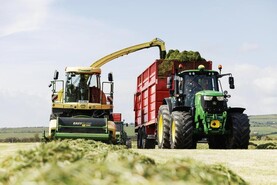With many parts of the country experiencing high grass covers, silage season will be upon us in the coming weeks.
Limerick City and County Council is advising farmers of their obligations to ensure that all effluent arising from silage operations are collected, stored and managed in accordance with the requirements set out in EU regulations.
Silage effluent is a particularly potent pollutant, with 200 times more polluting potential than raw domestic sewage, so it is essential that all effluents arising from the silage-making process are collected, stored and managed in a manner which ensures that water quality is not affected, the council said.
Precautions
Precautions farmers can make include ensuring that the silage base and associated collecting channels are free from defect and only use proprietary sealants where required.
When making pit silage, it is important to know how much silage the slab is capable of storing and additional silage should be stored on another slab or made into round bales.
It said that farmers and contractors should also ensure that grass is kept behind the drainage channels on the base and ensure that the drainage channels are kept free from blockage. The polythene cover should extend beyond the channels.
It is important to note that directly ensiled grass can release up to 30 litres of effluent per tonne for the first few days after ensiling and it is vital to keep a constant eye on the effluent collection tank, it stated.
If the silage effluent is observed leaking from the pit, measures must be taken to prevent entry to surface or ground waters and the farmer is obliged to report any such issue to Limerick City and County Council at 061-556 000 or on the out-of-hours emergency phone 061-417 833.






 This is a subscriber-only article
This is a subscriber-only article











SHARING OPTIONS: